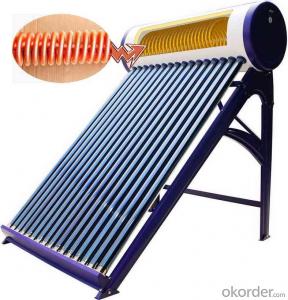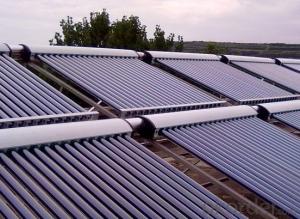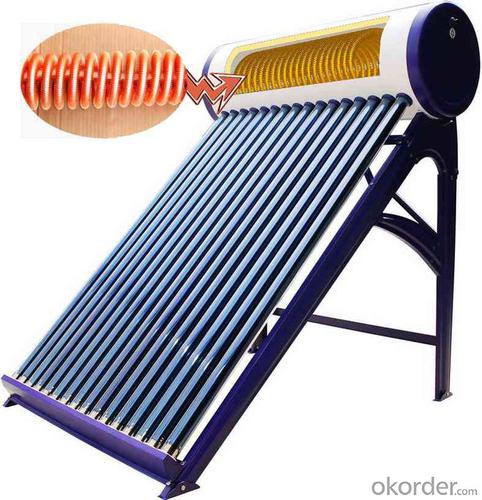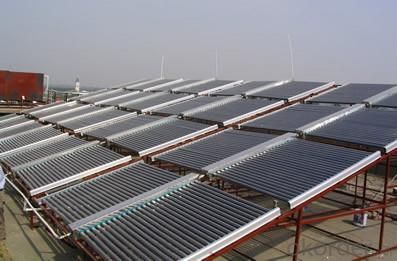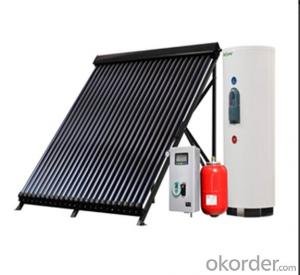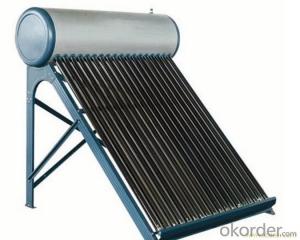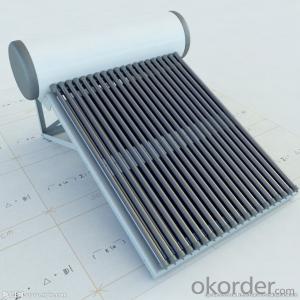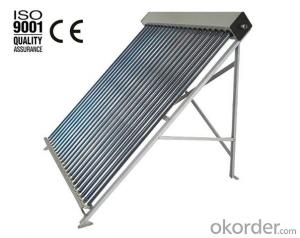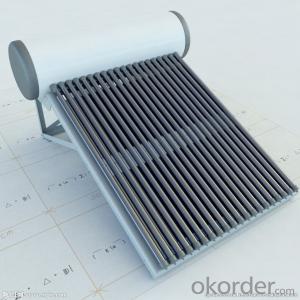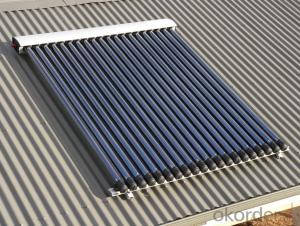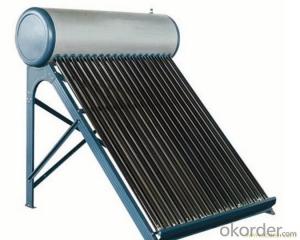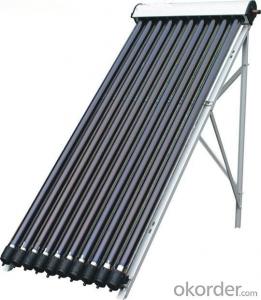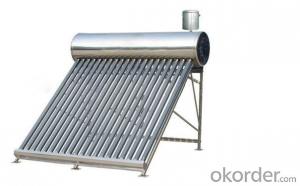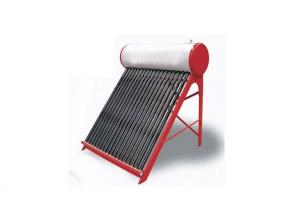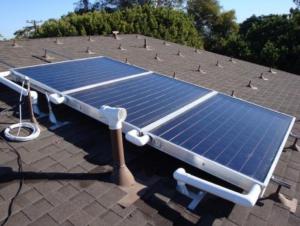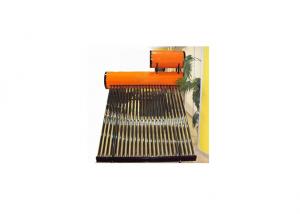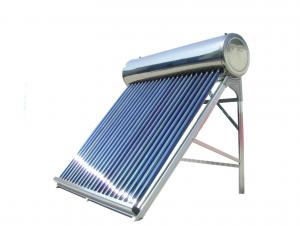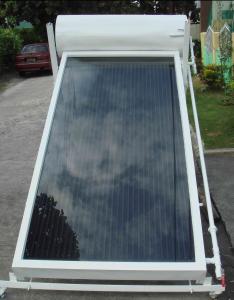Fafco Solar Water Heater - Vacuum Tube Solar Collector High Quality
- Loading Port:
- China main port
- Payment Terms:
- TT OR LC
- Min Order Qty:
- 10 set
- Supply Capability:
- 10000 set/month
OKorder Service Pledge
OKorder Financial Service
You Might Also Like
Introduction of Non-Pressure Solar Water Heater:
Non-pressure Solar Heater is one of the most economical solar water heating device with pretty high efficiency at the same time. It consists of hot water storage tank, solar vacuum tubes with mouth plug in storage tank, and bracket supporting tank and tubes.When cold water in evacuated tubes is heated with solar irradiation, as the specific gravities of hot water and cold water are different, hotter water goes upward to storage tank and colder water goes downward to glass tubes. through this continuous circulation, the cold water in storage tank will be gradually heated till sunset.
Solar water heaters working principle
1. The solar collector absorbs solar energy and transmits it to the solar water heater tank through circulation
2. When the temperature of the collector reaches the set value, the controller starts the circulation pump automatically
3. The circulation pump makes heat-conducting liquid circulate automatically
4. The heat-conducting liquid transfers heat to water by lower heat exchanger in the water tank.
5. When the temperature difference between solar collector and heat pipe solar water heaters tank doesn't reach the set value, the circulation pump will be shut automatically
6. In case the temperature of the water tank does not reach Tmax, Electric Heating Element will start to work automatically
Solar water heaters working station component:
1. Operating screen
2. Manometer
3. Pump speed adjust switches
4. Temperature difference circulation pump
5. Flow rate indicator
6. Return circuit connector
7. Safety valve
8. Expansion vessel connector9. Return circuit connector
10. Wall mounting
11. Expansion vessel:8L
12. Pressure resistance: 10 bar pressure for expansion vessel
Solar water heaters specification:
Description | solar water heaters |
Material of out manifold | 0.55mm thickness color steel/ fluorine carbon steel |
Material of inner tank | Food grade 2.0 mm thickness SUS304 stainless steel |
Tank insulating layer | 40mm 45kg/m³ high-density polyurethane foamed |
Inlet and outlet hole | Male G1'' |
Max pressure | 0.6 Mpa |
Solar collector tube | 3.3 Borosilicate glass with N/Al coating |
Thickness of glass tube | 1.6mm |
Vacuum tube tightness | P≤0.005 Pa |
Absorption | as=0.93-0.96 (AM1.5) |
Emission ratio | εh=0.04-0.06 (80C±5C) |
Idle sunning property parameters | Y=220~260m2.C/KW |
Average heat loss coefficient | ULT=0.6~0.7W/(m2.C) |
Bracket: | 2.0mm thickness aluminum alloy |
Tank weight | 75KGS |
Tank size | 560mm Dia x 1810mm Height |
Tank capacity | 300L |
Solar collector | 2pcs 58x1800x15tube solar collector |
Absorber area | 2.811 m² |
Working station | SP116 working station |
Heat exchanger length | Upper:12m, Underside:18m |
Solar water heaters details show:
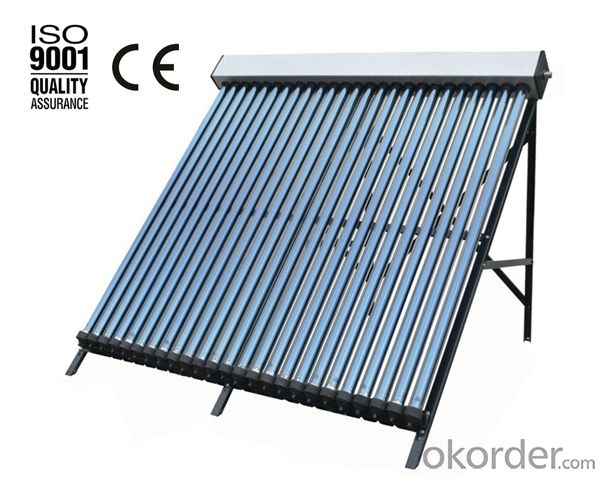
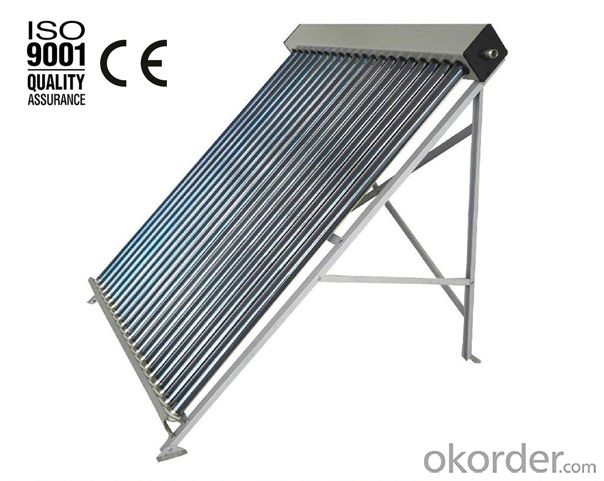
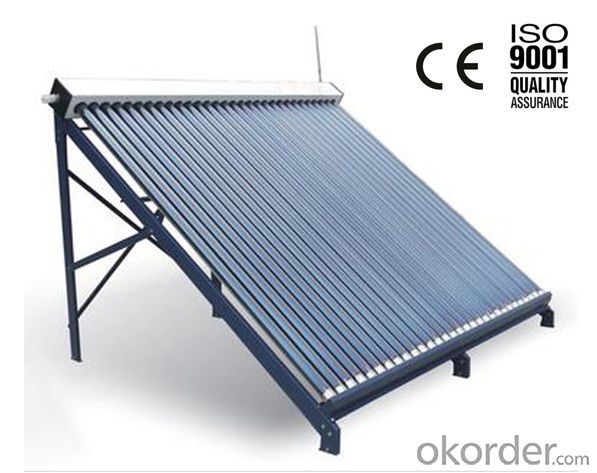
Benefits of this kind of solar water heaters:
1. Prolong the life of your existing water heater
2.Costs less than an electric, gas or oil water heater
3.No maintenance required
4.Lasts longer than a traditional hot water heater
5.Reduce your water heating costs
- Q: Can a solar water heater be used in areas with limited access to maintenance or repair services?
- Indeed, areas with limited access to maintenance or repair services can still make use of a solar water heater. These systems are designed to be durable and reliable, with few moving parts and a simple design that reduces the likelihood of breakdowns and the need for repairs. Furthermore, solar water heaters operate without the need for electricity or fuel, eliminating the regular maintenance required by conventional water heaters. This makes them particularly suitable for areas with limited access to maintenance and repair services, as there are no complex components that require specialized skills or equipment to fix. Nevertheless, it is important to note that periodic maintenance is still essential to ensure optimal performance and longevity. Users themselves or local technicians who have received basic maintenance training can typically carry out these tasks. Regular inspections, cleaning of solar panels, checking for leaks, and ensuring proper fluid circulation are some of the simple tasks that can maintain the efficiency of a solar water heater. In summary, even in areas with limited access to professional repair services, a solar water heater remains a viable and reliable option due to its low-maintenance nature and simple design. With proper care and occasional maintenance, a solar water heater can continue to provide hot water for many years.
- Q: Solar energy inside the house was old sin, the bottom of my heart despise this product. Two years to repair three, but have to use ah, see the winter, the electric heating rod is broken, then the agent of the solar energy has long been closed to run, and call to other home, said to be more than and 300. I look at the Internet, it will be able to buy 30-50 yuan. So I want to repair. But up to the roof dumbfounded, electric rods will not be demolished. Who help, tell how to dismantle the electric heating rod. I promise I won't be able to buy a solar water heater in the future! Mmm ~ ~
- There are two kinds of electric heating rods, like we use incandescent bulbs, a bayonet, a kind of silk mouth, first look at what kind of home,
- Q: Can a solar water heater be used in areas with low sunlight?
- A solar water heater can still be used in areas with low sunlight, although its efficiency may be reduced. While the amount of heat generated from solar energy will be lower in regions with less sunlight, the system can still provide some level of water heating. However, it is important to consider the local climate and sunlight availability before installing a solar water heater to ensure it meets the desired heating requirements.
- Q: Can a solar water heater be used in areas with limited space for solar panels?
- Yes, a solar water heater can still be used in areas with limited space for solar panels. This is because solar water heaters typically require fewer panels compared to other solar energy systems. Additionally, there are compact and space-saving designs available that can be installed in constrained areas, including rooftops and balconies.
- Q: How much space is needed for installing a solar water heater?
- The amount of space needed for installing a solar water heater depends on the size and type of the system. On average, a typical solar water heater requires around 10-15 square feet of roof space for the solar collectors. Additionally, a small space may be needed for the storage tank and other components, which can vary depending on the specific system design.
- Q: What are the safety precautions to consider when installing a solar water heater?
- When installing a solar water heater, there are several safety precautions to consider. Firstly, it is important to ensure that all electrical connections and wiring are done by a qualified professional to avoid any electrical hazards. Additionally, proper insulation and protection should be in place to prevent any potential leaks or water damage. It is also crucial to follow manufacturer's instructions and guidelines during installation and maintenance to ensure safe operation. Lastly, adequate ventilation should be provided to prevent the accumulation of gases and to allow for safe combustion, especially in closed spaces.
- Q: How does a solar water heater affect the water quality?
- A solar water heater does not directly affect the water quality. It uses the sun's energy to heat water, but the heating process does not introduce any contaminants or impurities into the water. However, it is important to regularly maintain and clean the solar water heater system to prevent any potential build-up of sediment or mineral deposits that could impact water quality over time.
- Q: Are there any specific maintenance tasks required for a solar water heater?
- Yes, there are specific maintenance tasks required for a solar water heater. These include checking and cleaning the solar collectors regularly, inspecting the pump and valves for any leaks or malfunctions, ensuring proper insulation and weatherproofing, and monitoring the system's overall performance. Additionally, the anode rod may need to be replaced periodically, and the water tank should be flushed to remove sediment buildup.
- Q: Can a solar water heater be used in areas with high levels of atmospheric pollution?
- Yes, a solar water heater can still be used in areas with high levels of atmospheric pollution. The efficiency and performance of the solar water heater may be slightly affected due to reduced sunlight reaching the solar panels, but it can still generate hot water using the available solar energy. Regular maintenance and cleaning of the solar panels may be required to ensure optimal functioning in polluted areas.
- Q: What is the average lifespan of a solar water heater in different regions?
- The average lifespan of a solar water heater can vary depending on the region. In general, a well-maintained solar water heater can last anywhere from 15 to 30 years. However, certain factors such as climate, water quality, installation quality, and maintenance practices can influence the lifespan. In regions with harsh weather conditions or high mineral content in the water, the lifespan may be shorter compared to regions with milder climates and better water quality.
Send your message to us
Fafco Solar Water Heater - Vacuum Tube Solar Collector High Quality
- Loading Port:
- China main port
- Payment Terms:
- TT OR LC
- Min Order Qty:
- 10 set
- Supply Capability:
- 10000 set/month
OKorder Service Pledge
OKorder Financial Service
Similar products
Hot products
Hot Searches
Related keywords
